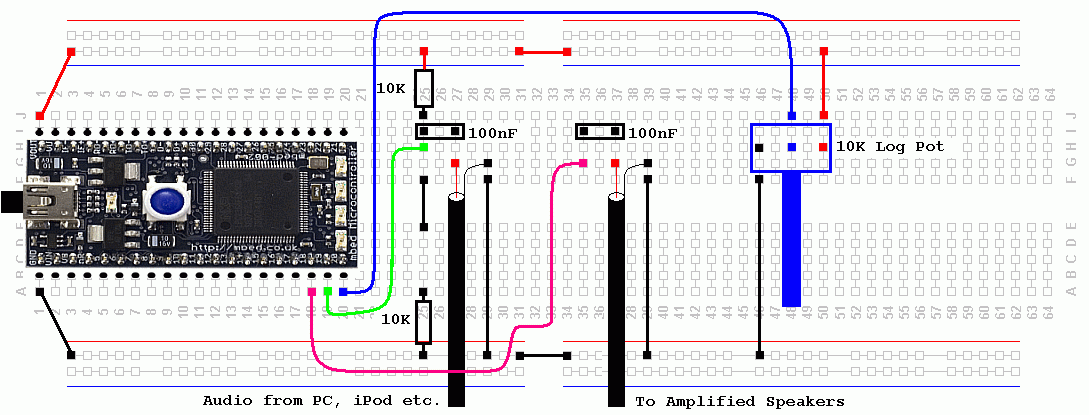

mbed Audio Phasing |
|
To gain access to revision questions, please sign up and log in.
This hardware and code implements an audio phasing sound effect.
There are some spurious sounds.
These might be removed by avoiding the use of breadboard and using techniques like single point earthing.
This sound effect works by adding the input signal to a very slightly delayed copy of the input. Depending on the delay time, certain frequencies are enhanced while others subtract and disappear from the output. Adjusting the delay, sweeps these frequencies up or down creating the phasing effect. Music studios almost certainly combine this effect with swept band-pass filtering to make the effect more dramatic.

#include "mbed.h"
#define MAX_QUEUE 512 // Indexed from 0 to 511
AnalogOut speaker(p18); // DAC for the speaker/output
AnalogIn mic(p19); // ADC for the microphone/input
AnalogIn pot(p20); // ADC for the pot
int main()
{
int queue[MAX_QUEUE]; // Will be a circular buffer
int ii = 0; // Queue write position
int jj = 0; // Q read position
int offset = 0; // Delay (number of samples)
int oo; // The analogue data read or written
while(1) // For ever
{
oo = mic.read_u16() - 32767; // Read ADC and remove DC offset
queue[ii] = oo; // Add sample to queue
jj = ii - offset; // Calculate playback position
if (jj < 0) jj = jj + MAX_QUEUE;// If queue pointer is negative, wrap it around.
ii = (ii + 1) % MAX_QUEUE; // Next position in the circular queue
if (ii == 0) // Read the potentiometer
{
offset = MAX_QUEUE * pot.read_u16() / 65535; // Scale the reading to fit the queue
if (offset >= MAX_QUEUE) offset = MAX_QUEUE - 1; // Limit the upper value
}
oo = oo + queue[jj]; // Add zero referenced signals: input + delayed_input
oo = oo + 32767; // Restore the DC Offset.
speaker.write_u16(oo); // DAC output
// FOR DEBUGGING if (!(ii % 16)) printf("oo = %5d | ii = %5d | jj = %5d | offset = %5d \n\r", oo, ii, jj, offset);
}
}
reviseOmatic V3 Contacts, ©, Cookies, Data Protection and Disclaimers Hosted at linode.com, London